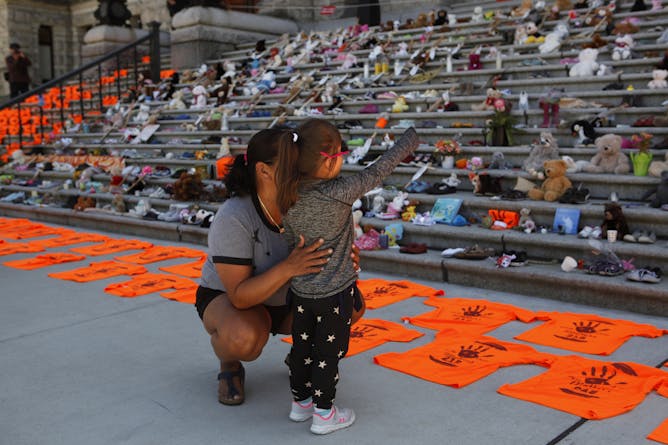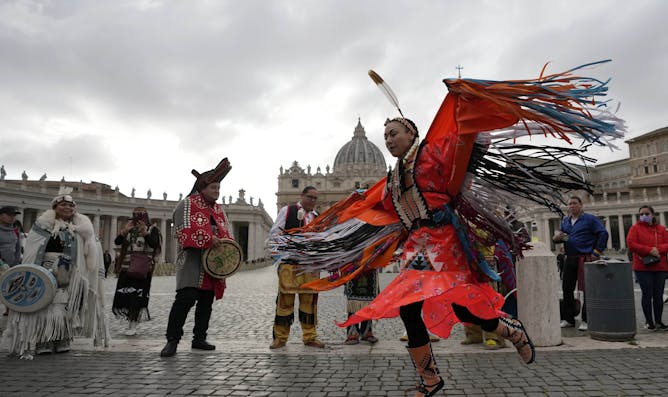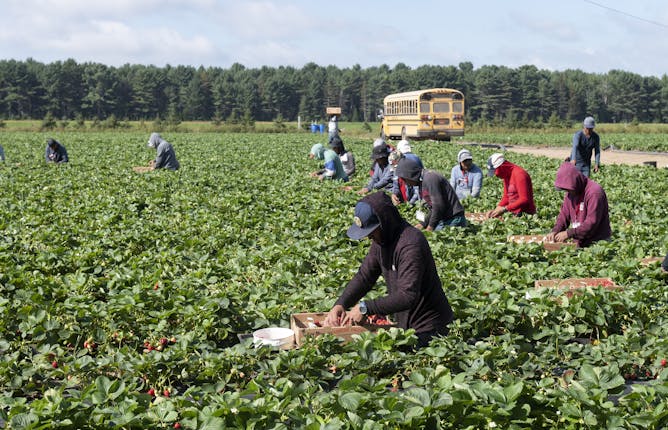|
Sparked by locating hundreds of possible unmarked graves at former Indian Residential Schools across the country, there has been a public reckoning with the ongoing legacies of the residential school system.
What most people don’t realize, however, is that Canada’s system of “Indian education” was not limited to residential schools. It also included a vast network of nearly 700 federally funded and church-run Indian Day Schools, and a class action for them closes today (July 13).
Today in The Conversation Canada, Sean Carleton from the University of Manitoba and Jackson Pind from Trent University talk about how Canada’s reckoning with colonialism and education must also include Indian Day Schools. They write, “If Canada is serious about putting truth before reconciliation, then the history and ongoing legacies of all kinds of colonial schooling need to be acknowledged and addressed.”
Also today:
|

A woman who attended an Indian Day School joins her daughter as they look at the Orange shirts, shoes, flowers and messages on display outside the B.C. legislature in June 2021.
THE CANADIAN PRESS/Chad Hipolito
Sean Carleton, University of Manitoba; Jackson Pind, Trent University
People must learn more about the history and legacies of residential schools and day schools and understand their relationship to Canada’s colonial project.
|

Members of the Assembly of First Nations perform in St. Peter’s Square at the Vatican on March 31, 2022.
(AP Photo/Alessandra Tarantino)
Tiffany Dionne Prete, University of Lethbridge
Pope Francis and the Catholic Church must make a plan with Indigenous Peoples, not for us, in order to walk the path of reconciliation. Some initial suggestions of what a plan might include.
|

Atlanta Braves outfielder Ender Inciarte argues with home plate umpire Doug Eddings during a game against the Arizona Diamondbacks.
(AP Photo/Ralph Freso)
Joël Guérette, Université du Québec en Outaouais (UQO); Caroline Blais, Université du Québec en Outaouais (UQO); Daniel Fiset, Université du Québec en Outaouais (UQO)
High temperatures make baseball players and coaches more irritable, and are associated with an increase in violence.
|

Migrant farm workers were disproportionately affected by COVID-19 because of poor housing conditions.
THE CANADIAN PRESS/Jacques Boissinot
C. Susana Caxaj, Western University; Anelyse Weiler, University of Victoria
Poor housing put migrant workers at risk for COVID-19. A federal government consultation on national housing standards is a crucial opportunity to support migrant workers’ health, safety and dignity.
|

Le voltigeur des Braves d'Atlanta, Ender Inciarte, argumente avec l'arbitre du marbre, Doug Eddings, lors d'un match contre les Diamondbacks d'Arizona.
(AP Photo/Ralph Freso)
Joël Guérette, Université du Québec en Outaouais (UQO); Caroline Blais, Université du Québec en Outaouais (UQO); Daniel Fiset, Université du Québec en Outaouais (UQO)
Les températures élevées rendent les joueurs et entraîneurs de baseball plus irritables, les amenant à commettre plus d’actes de violence.
|
Ukraine Invasion
|
-
Stefan Wolff, University of Birmingham
This was the first time Russia, China and the west have come face to face since the invasion of Ukraine. It did not go well.
|
|
|
|
Culture + Society
|
-
Robert Launay, Northwestern University
The fundamental issue at stake in abortion debates is personhood, which is viewed differently around the world, an anthropologist writes.
|
|
Science + Tech
|
-
Martin Barstow, University of Leicester
Even experts were not prepared for the crispness of the new images from the James Webb Space Telescope.
|
|